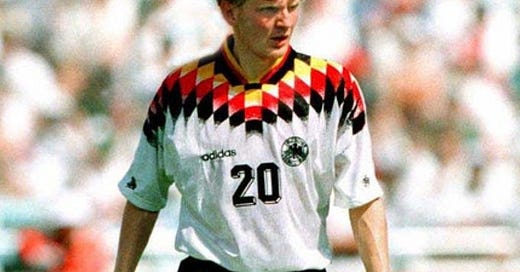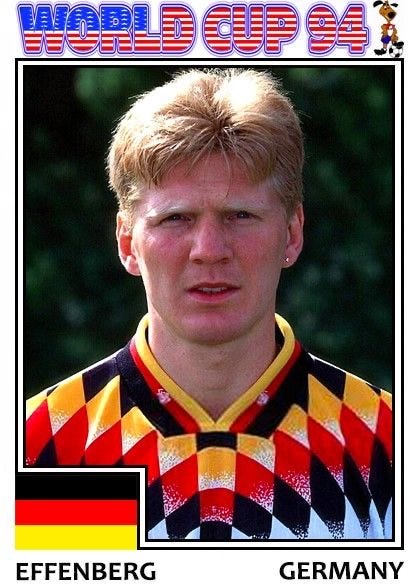At the 1994 World Cup, under the relentless Texan sun, the holders were beginning to sweat. Germany, a team synonymous with discipline and efficiency, were facing a barrage from South Korea.
By the second half, a comfortable 3-0 lead had been clawed back to 3-2, with the Koreans pressing hard for an equaliser. The world champions were visibly rattled, and none more so than Stefan Effenberg.
As South Korea surged forward time after time, Effenberg’s frustration began to boil over. He was arguing with teammates and struggling in the extreme heat. His game was done.
As the Mönchengladbach man was withdrawn to the sound of boos from the German support, he turned to face the fans. In one shocking moment, he raised an arm and flicked a middle finger.
This gesture wouldn’t go down well in any country. For Germany, a nation with a strict sense of decorum and respect for fans, this was an unforgivable insult. Manager Berti Vogts, who had worked hard to create a disciplined and harmonious squad, was understandably furious.
Effenberg was promptly dismissed from die Mannschaft. In the early hours of the following morning, he was already on a flight home.
Back home, the reaction was brutal. German tabloids printed his image on the front pages, denouncing him as a disgrace to the country. TV pundits called for him to be banned from the national team for life.
However, for a contingent of fans, Effenberg’s act of defiance was a rare moment of raw honesty from a player. To some, he was a maverick who played with a recklessness that made football feel less choreographed and more real.
Despite this, Effenberg’s exile would last for years, defining him as a highly talented player who became something of a pariah in his own country. Despite being a pivotal figure in German club football, leading Bayern Munich to Champions League glory and establishing himself as one of the Bundesliga’s most revered midfielders, his reputation as a rebel only grew.
Reporters would chase him for stories of wild parties, off-pitch antics and clashes with teammates. It was almost as if the incident in Dallas had set him on a path where he would embrace the role of the rule-breaker.
Despite returning to play two friendlies in 1998, Effenberg’s international career wasn’t what it could have been. His was the story of a man who didn’t fit, couldn’t play the part and wouldn’t back down even if it meant burning every bridge.





I was just reading about this. For a country that wins so consistently, the relationship between the Mannschaft's star players and the fans is often strangely fractious.